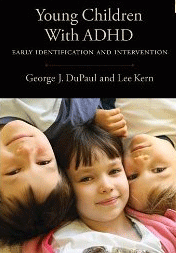Young Children with ADHD: Early Identification and Intervention

“Young Children with ADHD: Early Identification and Intervention”
By George J. DuPaul and Lee Kern
American Psychological Association
Washington, D.C., 2011
‘Trendsetting’ book is impressive
Reviewed By James K. Luiselli, Ed.D., ABPP, BCBA-D
Children who have attention deficit hyperactivity disorder (ADHD) are frequently referred to psychologists and related mental health professionals. Public schools and parents also regularly seek consultation to address learning and behavior challenges in classrooms and homes, respectively. Although most research has centered on elementary school-age children, more recent studies and related inquiry have emphasized early intervention with young children ages two to five years, who have been diagnosed with or are at risk for ADHD.
Authors George J. DuPaul, a professor of school psychology and Lee Kern, a professor of special education, have written an exemplary book they hope will “provide comprehensive, empirically grounded information on assessment and early intervention for young children with ADHD.” Covering nine distinct topics, each chapter includes descriptive case examples and integrates pragmatic and research considerations. Much of the book’s content is based on the author’s comprehensive program at Lehigh University and collaborative partnerships.
I was pleased to find an introductory chapter that appraises the most current ADHD diagnostic and assessment procedures. Typically, diagnosticians and evaluators rely on a combination of structured interviews, standardized rating scales, direct observations and tests of attention and impulsivity.
DuPaul and Kern not only described these methods but suggest useful tactics for interpreting data and making assessment-derived decisions about intervention. Critically, they also elaborate about developmental factors that influence the diagnostic process with children five years-old and younger.
The basis for the book, indeed its essential framework, is a three-tiered approach to prevention and intervention that DuPaul and Kern trace to formative public health initiatives, medical risk mediation and educational and behavioral models linked to school-wide positive behavior support and response to intervention (RtI).
With families, this approach incorporates parent education, home-based coaching and intensive child-focused intervention plans. Applied to preschool settings, the approach entails class-wide contingencies, small group skills instruction and individual-child behavior support. Again, the book excels in describing practical implementation of these and other applications.
Because young children with ADHD are more likely than their typically developing peers to enter school with academic problems, DuPaul and Kern attend to procedures for promoting language, reading and mathematic skills. I was also impressed with their highly instructive chapter about safety and injury prevention including checklists for determining child risk within diverse settings. The book rounds out with chapters on psychotropic medication, family counseling, and future directions within and between disciplines.
I can’t say enough good things about this book, to my knowledge, the first one to wholly embrace assessment and intervention with preschool-age children who have or may develop ADHD. Most praiseworthy is the insightful analysis of contemporary matters such as primary prevention, evidence-based methods and research-to-practice translation. Furthermore, the book has a scientist-practitioner orientation, making it a desirable resource for professionals in search of empirically-supported procedures. Additionally, I recommend the book as a primary or supplementary text for university coursework in child development, clinical child psychology and special education. This is a seminal and, I suggest, trendsetting publication.
James K. Luiselli, Ed.D., ABPP, BCBA, is senior vice president, applied research, clinical training and peer review at the May Institute in Norwood, Mass.
Learn more about the book: Young Children With ADHD: Early Identification and Intervention
